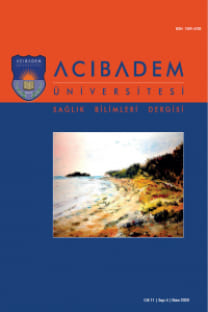Sigmoid Kolon Tutulumlu Mikroskopik Polianjiit; Ağrısız Kanama ile Başvuran Bir Olgu
Microscopic Polyangiitis With Sigmoid Colon Involvement; Presenting As Painless Rectal Bleeding
microscopic polyangiitis, colon, bleeding,
___
Soto O, Conn DY. Polyarteritis nodosa and microscopic polyangiitis. In Rheumatology. Third Edition. Hochberg MC, Silman AJ, Smolen JS, Weinblatt ME, Weisman MH Eds., vol2, Mosby Edinburgh 2003 Elsevier: 1611-21Guillevin L, Durand-Gasselin B, Cevallos R, Gayraud M, Lhote F, Callard P, Amouroux J, Casassus P, Jarrousse B. Microscopic polyangiitis: clinical and laboratory fi ndings in eighty-fi ve patients. Arthritis Rheum. 1999 Mar; 42(3):421-30.
Bailey M, Chapin W, Licht H, Reynolds JC. The eff ects of vasculitis on the gastrointestinal tract and liver. Gastroenterol Clin North Am 1998; 27(4): 747-82
Tsai CN, Chang CM, Chuang CH, Jin YT, Liu MF, Wang CR.Extended colonic ulcerations in a patient with microscopic polyangiitis.Ann Rheum Dis. 2004 Nov;63(11):1521-2.
Hogan SL, Nachman PH, Wilkman AS, Jennette JC, Falk RJ. Prognostic markers in patients with antineutrophil cytoplasmic autoantibody- associated microscopic polyangiitis and glomerulonephritis.J Am Soc Nephrol. 1996 Jan;7(1):23-32.
Collins DA, Duke O. Systemic vasculitis presenting with massive bowel infarction. J R Soc Med. 1995 Dec;88(12):692-3.
Spahn TW, Ullerich HJ, Lebitz P et al. Gastrointestinal bleeding secondary to hepatic artery involvement of microscopic polyangiitis: case report and review of the literature. Dig.Dis.Sci 2007 Jun;52(6):1558-61.
- ISSN: 1309-470X
- Yayın Aralığı: 4
- Başlangıç: 2010
- Yayıncı: ACIBADEM MEHMET ALİ AYDINLAR ÜNİVERSİTESİ
Kifoskolyozlu Böbrek Taşı Hastalarında Perkütan Nefrolitotomi Operasyonu
Murat Tuğrul EREN, Ahmet ŞAHİN, Kubilay İNCİ, Cenk Yücel BİLEN, Haluk ÖZEN
Hasan Murat TANYERİ, Şenol POLAT, Elif AKSOY
Bosniak Tip III Böbrek Kistinin Spontan Regresyonu
Enis Rauf COŞKUNER, Burak ÖZKAN
Şahin ŞENAY, Fevzi TORAMAN, Sinan DAĞDELEN, Hasan KARABULUT, Cem ALHAN
Mide Ülserli Hastalarda Endoskopi Tekrarı Akılcı Bir Yaklaşım mı?
Murat SARUÇ, Deniz BÖLER, Mehmet KARAARSLAN, Ümit İNCE, Kemal RAŞA, Cihan URAS, Metin ÇAKMAKÇI, Nurdan TÖZÜN
Gebelikte Akut Karın Nedeni Olarak Miyom Torsiyonu
Harika Bodur ÖZTÜRK, Belgin SELAM, Cem DEMİREL, Tolga ERGİN, Arda LEMBET
Diabetes Mellitus’lu Pediatrik Hastada Gelişen Charcot Artropatisi: Olgu Sunumu
Umut AKGÜN, Barış KOCAOĞLU, Bülent EROL, Mustafa KARAHAN, Tanıl ESEMENLİ
Sigmoid Kolon Tutulumlu Mikroskopik Polianjiit; Ağrısız Kanama ile Başvuran Bir Olgu
Arzu TİFTİKÇİ, Gürkan YURTERİ, Özlen ATUĞ, Çiğdem ÇELİKEL, Şule YAVUZ, Hülya HAMZAOĞLU
